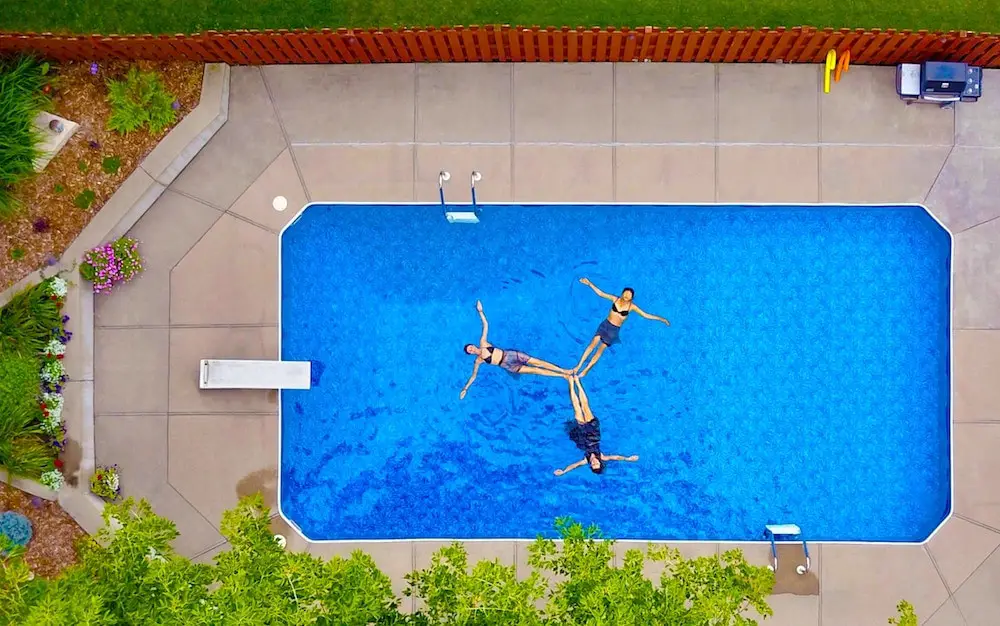Swimming pools are a staple for many homeowners across the country. They can be a great addition to any home, but they also pose additional risks and open up a homeowner to additional liability.
According to the U.S. Consumer Product Safety Commission, roughly 3,060 kids under the age of 15 were treated in an emergency room for pool-related injuries in 2021. This could leave the homeowner stuck with the bill or potentially a lawsuit. With that in mind, it is important to understand whether a homeowners policy covers swimming pools and the liability related to it.

- Some homeowners insurance companies cover swimming pools, while other do not.
- A swimming pool can be covered under various sections of coverage in a homeowners policy, leading to different coverage limits.
- Liability protection is especially important when a homeowner has a swimming pool and may not fully cover an injury related to a pool.
Does home insurance cover damage to the pool itself?
The answer is that it largely depends on the homeowners insurance provider. Swimming pools are property features that some insurance companies will cover and others will not. Some other companies may also require a specific set of criteria to be met in order for the swimming pool to be covered.
Some companies simply won’t insure the homeowner at all if they have a pool on their property as it is deemed to be too great of a risk to the company. This means no part of the house would be covered, so another insurance company would be needed.
There are some insurance providers out there who require specific criteria regarding the swimming pool in order to issue a policy to the homeowner. These criteria typically include things like:
- A self-latching gate must surround the perimeter of the pool
- Lights must be placed around the pool to reduce the risk of slipping or falling at night
- The diving board must have a non-skid surface
- In an above-ground pool there must be a lock on the ladder
- Not installing a slide or diving board
If your insurer does cover swimming pools, it can only be covered if it’s damaged by one of the risks included in your home insurance policy. Covered risks include hail, vandalism, fire, explosion, vehicle collision, and lightning strikes. For instance, hailstorm happened and damaged your pool, your home insurance company will pay for the repairs – depending on your coverage amount, deductible, and type of coverage you have.
It is crucial to understand what your insurance company requires as you can see that the stipulations around pool coverage vary dramatically depending on the company.
How does homeowners insurance policy cover pool damage?
How a homeowners policy covers pool damage varies depending on what kind of swimming pool is on the property. There are two types of pools: above-ground and in-ground pools. These lead to different types of coverage.
In-ground pools
In-ground pools are simpler to understand how they are covered. In-ground pools are typically covered under the dwelling section of the policy or under the other structures section. Now, these two sections of coverage can provide the homeowner with very different coverage limits. If the in-ground pool is covered under the dwelling section, it will have a higher coverage limit as dwelling coverage A is usually up to the replacement cost or actual cash value of the dwelling. On the other hand, other structures coverage B is usually limited to 10% of the dwelling coverage limit. If the pool is covered by coverage B, the damage may not be fully reimbursed. Make sure to check with your insurance agent and read through your policy to determine how your in-ground pool is covered.
Above-ground pools
Above-ground pools can vary in their coverage. Generally, they are covered under the personal property section of a homeowners policy. This provides a number of factors for the homeowner to consider. The perils that are covered in the policy may not be the same as is covered in the rest of the policy, potentially leading to damage to a property that doesn’t cover the pool but covers the rest of the property. Under the personal property section of the coverage, insurers also typically have a total maximum limit of how much they will reimburse a homeowner for personal belongings that have been damaged or stolen. They will also typically have sub-limits for each type of personal property; therefore, an above-ground swimming pool may be subjected to a lower reimbursement limit than the overall personal property coverage limit.
Some homeowners have above-ground pools that have been permanently installed with potentially a deck or some other structure around it. If this is the case, the pool will most likely be covered under the other structures section of coverage, which leads to the same coverage limits as discussed with in-ground pools.
Again, make sure to read through your policy and talk with your insurance agent to determine how the pool is covered and to what extent it is covered.
Does a homeowners insurance cover pool-related injuries?
Generally speaking, your home insurance policy should cover pool-related injuries. The coverage may vary depending on a few factors including how the injury occurred and the laws of the municipality that you live in when it comes to pool-related injuries. It is beyond the scope of this article to discuss various local laws, but we can discuss coverage depending on how the injury occurred.
If someone who wasn’t invited nor given permission to use a homeowner’s pool ultimately gets injured, it is possible that the homeowner would not be held responsible for any medical expenses or legal bills that may come of that occurrence.
If someone is invited or given permission to use a homeowner’s pool and becomes injured, then the homeowner is most likely covered for medical expenses or legal fees that may come about from the injury. This coverage would be under the personal liability section of coverage within the policy. There are maximum limits to this section of coverage and they are usually fairly low, coming in around the $1k-$5k range. This may not be enough to fully cover the homeowner for expenses incurred as a result of the injury. Talk with your insurance agent about the amount of liability coverage you have. If you feel it is not enough, you may be able to look at getting additional liability coverage or even a personal umbrella policy to increase the liability protection limit. Additional coverage may give you the peace of mind you need when you have a pool on your property.

Having a pool will increase your home insurance premium
A swimming pool is a liability magnet and insurance companies consider it a big risk in your home. That is why your home insurance premium will increase if you install a swimming pool in your home. Since it opens up the possibility of a guest having a swimming-related injury, your liability coverage will increase. Home insurance policies can include up to $100,000 in liability insurance, but if you have a pool, insurance companies will recommend you to increase your home insurance liability coverage to $500,000. Since swimming pools inherently cause more potential for injury, adding additional liability insurance like an umbrella policy can be beneficial. Your dwelling coverage will increase as well, resulting in higher home insurance premiums.
Umbrella Policy
Purchasing a personal umbrella policy should also be considered so that you can have an extra layer of protection for your pool. If an accident happens and a person became seriously injured after the incident, medical expenses and a court case can wipe your money out if you don’t have an umbrella policy added to your home insurance. An umbrella policy is a coverage that provides extra liability once your home insurance policy limit exceeds. It covers medical bills and lawsuits in cases where someone got injured in your home.
Measures to take to reduce the risk of swimming pool related injury and liability
As mentioned above, some insurers may require the home owner to put some safety measures in place to reduce the chance of injury from a swimming pool and any liability to the homeowner that may come from that. Here are six actions that can be taken by a homeowner to pool related injury and liability:
- Build a fence with a gate that is able to lock around the perimeter of the pool
- Install some sort of an alarm on the gate
- Always swim with another person
- Become CPR certified
- Keep potential obstacles away from the pool
- Lock, remove, or raise ladders for above-ground pools
Frequently Asked Questions
Does a swimming pool increase a home insurance premium?
Yes, a swimming pool will most likely increase the premium of the homeowners policy. It could potentially be a big increase depending on a multitude of factors. Putting safety measures in place may help reduce the additional cost in premiums. Every insurance company will look at these factors differently. Some insurers will ask you to increase your personal liability limits.
Does home insurance cover pool leaks?
Probably not. It must be determined that a pool leak was caused by a covered peril in order for it to be covered, but most likely the leak will be attributed to general wear and tear or homeowner neglect, which are perils that are not covered under a home insurance policy.
Does home insurance cover a pool collapse?
Potentially. A policy covering a pool collapse depends on if the cause of the collapse was due to a covered peril in the policy or not. Check to see what perils are covered in your policy for a swimming pool.
Does home insurance cover pool pumps?
Possibly. If damage to the pool pump was due to a covered peril it would be, but if it was due to a peril not covered, like homeowner neglect, damage to the pump would not be covered.
Does home insurance cover freeze damage?
Probably not. A homeowners policy may cover freeze damage if it can be determined that the homeowner took all proper steps to maintain the pool and prevent any freeze damage. Freeze damage that could have been prevented with proper care by the homeowner, would not be covered. It usually is determined to be the homeowner’s neglect that damage to the pool was caused by freezing.
Does home insurance cover pool liners?
It depends. If damage to the pool liner is due to a covered peril in the policy, then it should be covered. If the damage was due to a peril that is not covered in the policy, like general wear and tear, then it wouldn’t be covered.

Conclusion
It is a pretty exciting experience to have a pool installed in your backyard. It can be the center of fun for your friends and family, especially when summer comes. However, not every homeowner knows how a swimming pool can affect their home insurance policy. It brings liability risk, increased responsibility, and potential damage to your backyard and your home. Before deciding to build a pool in your backyard, make sure to contact your insurance company first. It is essential to know the proper insurance coverage needed for the risks that accompany your pool.
To reduce more risks, it’s important to consider the ways how to keep your pool safe to use. Prevent any accidents by applying safety measures, especially if there are kids in your home. Installing gate and pool alarms, taking your kids to swimming lessons, learning CPR, and putting on safety pool covers are just some of the preventive measures that you should do to make sure that you, your family, and your guests are safe from any pool-related injuries.

